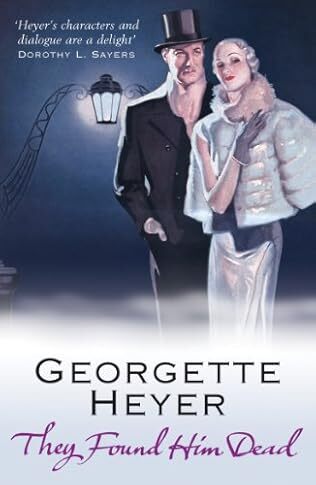They Found Him Dead

A review of They Found Him Dead by Georgette Heyer – 250202
The third in Heyer’s Inspector Hannadyne series and originally published in 1937, we find ourselves back in familiar territory. A party to celebrate the sixtieth birthday of Silas Kane, an industrialist, reveals a number of tensions amongst the assembled guests, many of whom are introduced at bewildering speed by Heyer. There is little time to pause for breath and the relationships are hard to grasp initially, although, in fairness to the author, things become clearer as the story develops.
Once the majority of the guests, Silas goes for his customary walk along the cliff edge, even though it is misty. His body is found at the bottom of the cliff the following day. It looks like a tragic accident, although the precocious Timothy Harte, fed on a diet of American gangster films, believed that the strained atmosphere at the party was guaranteed to lead to murder.
Clement Kane, Silas’ cousin, inherits the estate and to the horror of his elderly aunt Emily, he and his wife, Rosemary, move into the house. Some weeks later Clement is fatally shot from outside the study, although, while everyone heard the shot, no one saw the culprit escape. To his surprise, the estate passes to Jim, Silas’ nephew, and two attempts are made on his life, once when his speedboat capsizes – Timothy had taken it out unauthorized at the time – and when the steering of his car is tampered with. As he had his fiancée, Patricia, with him, Jim was not travelling at his usual speed which saved his life.
After Clement’s murder Inspector Hannadyne aided by his usual assistant, Sergeant Hemingway, investigate. There are three main strands of motivation. Clement was in need for money to fund his wife’s extravagant lifestyle and Silas’ death was opportune. But why was he then killed? Perhaps it was at the instigation of his wife who could then elope with her lover, Trevor Dermott.
Silas’ business partners, Joseph and Paul Mansell, are in favour of a speculative Australian venture and pressure is being put on for a speedy decision by the fixer, Oscar Roberts. Both Silas and Clement were against the deal, especially as it was their capital rather than the Mansell’s that was at risk. Were they both removed to hasten the deal and was Jim’s unexpected legacy the reason why he too had to be eliminated?
The third strand is the Australian branch of the family, whom most of the Kane entourage had anticipated would inherit upon the deaths of Silas and Clement. Were their murders intended to expedite the inheritance and did Jim’s unanticipated inheritance imperil his life?
In truth, the plot is fairly simple and formulaic and it is relatively easy to work out who the culprit was, as a major clue is dropped around the halfway mark. The mechanics of Clement’s murder show a degree of ingenuity on the writer’s part and the police miss an enormous trick when they fail to search a water butt handily placed near the study as the murderer had to get rid of the gun in double quick time. What rescues the book for me is the characterization, Heyer producing several memorable figures who will remain with me for some time.
There is the wonderfully awful wife of Clement Kane, Rosemary, a self-centred, selfish woman who is sensitive to her nerves and openly has an affair. The book rather loses its shine when she fades from the narrative, only to be rescued by the force of nature that is Lady Harte, an intrepid explorer and would-be MP who has an unconventional approach both to life in general and motherhood in particular. Her younger son, Timothy, is another in the line of precocious boys that populate detective fiction, although older than the norm, who has a better appreciation of what is really going on than his elders. I also enjoyed his stepfather, Sir Adrian, who drifts through life exuding an air of debonair insouciance.
As a murder mystery it is pretty second rate, but the characters bring it to life.



